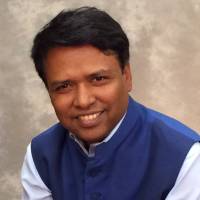Keynote speakers
Keynote speaker Session 1: Urban-Rural cleavages and Democracy
Ganbat Damba (Academy of Political Science): The perception of Mongolians about democracy: Do we have differences?
 Dr. Ganbat Damba is a Chairman of the Board of the Academy of Political Education in Ulaanbaatar, Mongolia. The Academy of Political Education is a non-government institution which engages in research and training both in the city and countryside and has made key contributions in promoting democratic values such as human rights and freedoms, rule of law, role of an individual in the society and democratic election. From 1999 to 2010 he worked as an Executive director of the Academy. Since 2009 to 2017 he was an advisor to the President of Mongolia on research and a Director of the Institute for Strategic Studies of Mongolia. Since May, 2017 he is an Ambassador of Mongolia to the Federal Republic of Germany.
Dr. Ganbat Damba is a Chairman of the Board of the Academy of Political Education in Ulaanbaatar, Mongolia. The Academy of Political Education is a non-government institution which engages in research and training both in the city and countryside and has made key contributions in promoting democratic values such as human rights and freedoms, rule of law, role of an individual in the society and democratic election. From 1999 to 2010 he worked as an Executive director of the Academy. Since 2009 to 2017 he was an advisor to the President of Mongolia on research and a Director of the Institute for Strategic Studies of Mongolia. Since May, 2017 he is an Ambassador of Mongolia to the Federal Republic of Germany.
Ganbat Damba received his Ph.D. in 2002 from the Academy of Science of Mongolia. He is currently a member of the regional Asian Barometer Survey (ABS) working group in charge of Mongolia (since 2002). Under his management the ABS was conducted four times in Mongolia. From 1996 to 1999 he served as an expert in Foreign Aid Coordination Unit under Prime Minister of Mongolia. 2009-2015 he was a Board Member of the National Public TV/Radio, 2014-2016 a member of Ministerial Board of the Ministry of Foreign Affair of Mongolia.
Dr. Ganbat Damba has published various articles examining democratization, democratic and authoritarian values, elections, political party development and on principles of foreign and security policy of Mongolia. His publications include the Routledge Handbook of Democratization in East Asia (Tun-jen Cheng, Yun-han Chu, 2018), Youth and Democratic Citizenship in East and South East Asia: Exploring political attitudes through the Asian Barometer Survey (UNDP Press, 2014), Democratization and its Impact. Mongolian case (Shin Toli Journal), How East Asians View Democracy. The Mass Public and Democratic Politics in Mongolia (Columbia University Press), Democratic Governance Indicator (UNDP-Government of Mongolia), Reader on Democracy (Academy of Political Education. Ulaanbaatar 2006), Glossary on Democratic Governance and Open Society (Open Society Forum-UNDP).
Keynote speaker Session 2: Civil Society and Democracy
Steven Fish (University of California, Berkeley): Civil Society's Indispensability for Liberal Democracy
 Steven Fish is Professor of Political Science at University of California, Berkeley. He studied for his PhD at Stanford University in the Political Science. He teaches courses at the graduate and undergraduate levels in general comparative politics, foundations of social theory, regime change and democratization, and politics, society, and economy in Eurasia.
Steven Fish is Professor of Political Science at University of California, Berkeley. He studied for his PhD at Stanford University in the Political Science. He teaches courses at the graduate and undergraduate levels in general comparative politics, foundations of social theory, regime change and democratization, and politics, society, and economy in Eurasia.
Steven Fish’s research interests include political regimes and regime change, social movements, political parties, constitutional systems and national legislatures, and the sociology of religion. He did extensive fieldwork in Eurasia, Eastern Europe, and Southeast Asia, and has also research experience in Western Europe, East Asia, and Latin America. He has served as consultant to U.S. government organizations, including the Department of State and other federal government agencies and as consultant to a variety of international organizations, such as the European Commission for Democracy through Law (the Venice Commission) and the e-Parliament. He also serves as commentator in electronic media, including Al-Jazeera English, CCTV, CNN International, CNBC, the BBC, KGO TV San Francisco, KTVU TV Oakland, and KRON TV San Francisco.
Among his article and books are: Indonesia: Democracy despite Scarcity (Journal of Democracy), Fighting Reversion: Strong Legislatures as the Key to Bolstering Democracy (in: Nathan J. Brown, ed., The Dynamics of Democratization: Dictatorship, Development, and Diffusion, Baltimore: Johns Hopkins University Press), Failed Democratization (in: Christian W. Haerpfer, Patrick Bernhagen, Ronald F. Inglehart, and Christian Welzel, eds., Democratization, New York: Oxford University Press), Democratization and Economic Liberalization in the Postcommunist World (Comparative Political Studies), The Inner Asian Anomaly: Mongolia’s Democratization in Comparative Perspective (Communist and Post-Communist Studies), Mongolia: Democracy without Prerequisites (Journal of Democracy).
Keynote speaker Session 3: Extractive Economics, Rich-Countries and Democracy
Tapan Sarker (Griffith Business School): The Role of democratic governance in improving transparency and accountability of Multinational enterprise in resource-rich countries
 Dr. Tapan Sarker (PhD, The Australian National University) is a Senior Lecturer in the Department of International Business and Asian Studies within the Griffith Business School and a member of the Griffith Asia Institute of Griffith University, based in Brisbane, Australia. He is also the Deputy Director (Research) at the Griffith Centre for Sustainable Enterprise of Griffith University.
Dr. Tapan Sarker (PhD, The Australian National University) is a Senior Lecturer in the Department of International Business and Asian Studies within the Griffith Business School and a member of the Griffith Asia Institute of Griffith University, based in Brisbane, Australia. He is also the Deputy Director (Research) at the Griffith Centre for Sustainable Enterprise of Griffith University.
Tapan Sarker has more than 20 years of teaching, research, administrative and consulting experience in a range of disciplinary areas including university, government, international NGOs and industry sectors. Within industry he has worked as a project manager and consultant for leading resource sector companies such as BHP Billiton, Rio Tinto, Mahindra and Mahindra Ltd (India) and Sinarmas Forestry (Indonesia). Prior to joining Griffith University, he worked as a Fellow at the Centre for Social Responsibility in Mining at the University of Queensland. He was also a co-ordinator of LEAD (Leadership for Environment and Development) Japan program, an international NGO that has played a pioneering role in developing leadership capacity across sectors, and a Visiting Fellow at the Centre for Tax and Fiscal Policy Research at Harvard University.
Tapan Sarker has widely published in the area of sustainable growth, business ethics and corporate social responsibility, internal revenue mobilisation and taxation policy, and political economy of natural resources. He has authored/co-authored three books and over 25 journal articles on sustainable growth, climate change and political economy of natural resources. His most recent book Pathways to a Sustainable Economy: Bridging the Gap between Paris Climate Change Commitments and Net Zero Emissions (Springer, 2017), identifies challenges facing organizations in achieving zero greenhouse gas emissions by 2050 and a new energy economy, and to explore solutions from various sectors of the economy to enable the transition to a zero emissions future. Dr Sarker’s research has been published in high quality journals including the Asian Journal of Business Ethics, Economic Modelling, Australian Tax Forum, International Journal of Corporate Social Responsibility, and the Asia Pacific Development Journal.
Download as PDF